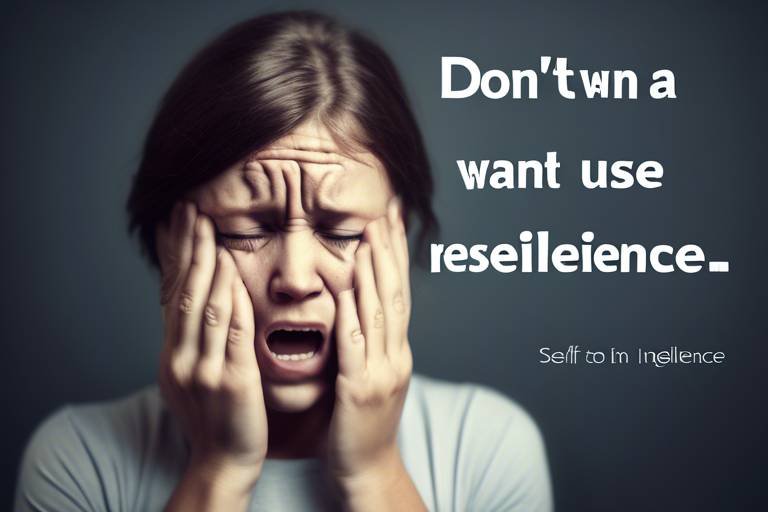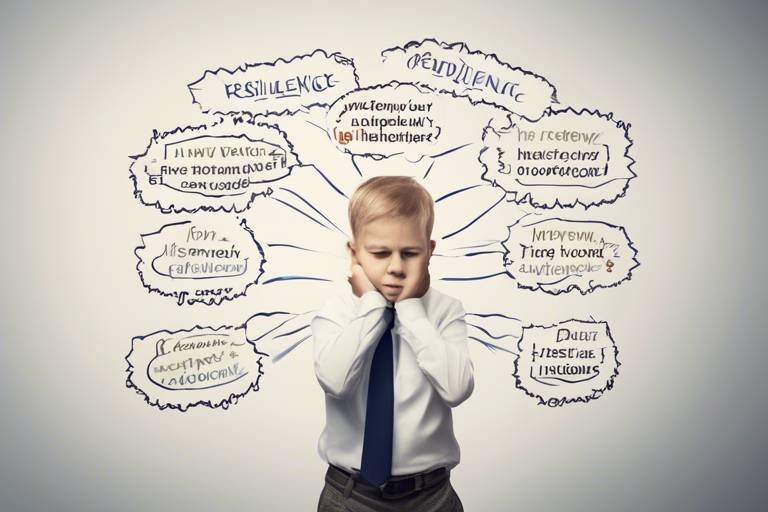Building Resilience to Cope with Life's Problems
Life is a rollercoaster, isn't it? One moment you're soaring high, and the next, you're plummeting down into the depths of challenges and adversity. But what if I told you that the key to navigating these ups and downs lies in resilience? Resilience is not just a buzzword thrown around in self-help books; it’s a vital skill that empowers you to bounce back from setbacks, adapt to change, and emerge stronger than before. In this article, we’ll explore practical strategies and insights to cultivate resilience, enabling you to tackle life's problems with confidence and grace.
So, why is resilience so crucial? Imagine being a rubber band. When stretched, it can either snap or return to its original shape, depending on its elasticity. Resilience works similarly; it allows you to withstand stress and adversity without breaking. This ability to adapt is essential for mental well-being. It empowers you to face challenges head-on, transforming obstacles into opportunities for growth. When you cultivate resilience, you not only improve your emotional health but also enhance your overall quality of life.
To build resilience, it’s important to recognize and leverage your personal strengths. Think of these strengths as your toolkit for navigating life's challenges. When you know what you’re good at, you can tackle obstacles with greater assurance and resourcefulness. But how do you identify these strengths? One effective method is through self-awareness and reflection.
Engaging in self-awareness practices allows you to reflect on your experiences, fostering a deeper understanding of your emotions and responses. This is where journaling comes into play. By putting pen to paper, you can articulate your thoughts and feelings, helping you process experiences and identify patterns in your behavior. Journaling serves as a powerful tool to gain clarity, enabling you to navigate challenges with a clearer mindset.
Consider journaling as your personal therapy session. It’s a safe space to explore your innermost thoughts without judgment. You can write about your day, your feelings, or even your dreams. Over time, you may notice recurring themes that highlight your strengths and areas for growth. This self-reflection can be incredibly enlightening, providing you with the insights needed to build resilience.
Another way to identify your strengths is by seeking feedback from trusted friends or mentors. Sometimes, we are too close to our own lives to see our strengths clearly. Constructive criticism can provide valuable insights, encouraging growth and resilience. Don’t shy away from asking for feedback; it can be a game-changer in your journey towards self-discovery.
Establishing a strong support network is vital for resilience. Think of your friends and family as your safety net. During tough times, social connections provide emotional support and practical assistance. Surrounding yourself with positive influences can make all the difference. Whether it's a quick chat over coffee or a heartfelt conversation, these interactions can uplift your spirits and reinforce your resilience.
Now that we’ve touched on self-awareness, let’s dive into effective coping strategies. These strategies are essential for managing stress and adversity, equipping you with the tools to navigate challenges more effectively. One of the most effective methods is practicing mindfulness and meditation.
Mindfulness and meditation are like a mental spa day. They enhance emotional regulation, reduce anxiety, and promote a sense of calm amid chaos. By taking time to focus on the present moment, you can gain perspective on your challenges and respond to them with a clearer mind. It’s about training your brain to pause before reacting, allowing you to approach problems with a level head.
Let’s not forget the power of physical activity! Regular exercise is not just about keeping your body fit; it significantly enhances mental resilience too. Think of it as releasing pent-up energy and stress. When you engage in physical activity, your body releases endorphins, those magical little chemicals that boost your mood and promote emotional balance. Whether it’s a brisk walk, a dance class, or hitting the gym, find an activity you enjoy and make it a part of your routine.
- What is resilience? Resilience is the ability to bounce back from adversity, adapt to change, and keep going in the face of challenges.
- How can I build resilience? You can build resilience by identifying your strengths, practicing self-awareness, developing coping strategies, and building a support network.
- Why is mindfulness important for resilience? Mindfulness helps you stay present, reduces anxiety, and enhances emotional regulation, which are all crucial for coping with stress.
- Can physical activity improve my mental health? Yes! Regular physical activity releases endorphins and helps reduce stress, contributing to better mental health and resilience.

The Importance of Resilience
This article explores strategies and insights to cultivate resilience, enabling individuals to effectively navigate life's challenges and emerge stronger from adversity.
Resilience is not just a buzzword; it’s a vital skill that can make the difference between thriving and merely surviving in the face of life's challenges. Think of it as your emotional armor, protecting you from the arrows of stress and adversity. When we talk about resilience, we’re referring to the ability to bounce back from setbacks, adapt to change, and keep moving forward despite difficulties. Why is this so crucial? Well, life is unpredictable, and everyone encounters obstacles—be it personal struggles, professional setbacks, or unexpected crises. Resilience empowers individuals to face these challenges with confidence and adaptability.
Imagine you’re a rubber band. When stretched, you may feel the pressure and discomfort, but once the tension is released, you return to your original shape, often even stronger than before. This analogy beautifully encapsulates the essence of resilience. It’s about bending without breaking, adapting to the pressure while maintaining your core integrity. Resilience fosters a mindset that encourages learning from experiences, rather than being defeated by them.
Moreover, resilience is intricately linked to mental well-being. Studies have shown that resilient individuals tend to experience lower levels of anxiety and depression. They possess the ability to regulate their emotions effectively, allowing them to navigate stressors with a sense of calm. This isn’t to say that resilient people don’t feel pain or sadness; rather, they acknowledge these emotions and use them as stepping stones for growth. In essence, resilience acts as a buffer against the adverse effects of stress, enabling individuals to maintain a positive outlook even during tough times.
To truly grasp the importance of resilience, consider the following benefits:
- Enhanced Problem-Solving Skills: Resilient individuals are better equipped to approach problems creatively and find solutions.
- Improved Relationships: Resilience fosters empathy and understanding, which can strengthen social connections.
- Greater Emotional Regulation: Those who cultivate resilience learn to manage their emotions, leading to healthier reactions in stressful situations.
- Increased Confidence: Overcoming challenges builds self-efficacy, making individuals more confident in their abilities.
In summary, resilience is not just about bouncing back; it’s about bouncing forward. It’s a dynamic process that involves growth and adaptation, allowing us to emerge from challenges not only intact but often transformed for the better. By understanding the importance of resilience, we can take proactive steps to cultivate this invaluable skill, ensuring we are well-prepared to face whatever life throws our way.
Recognizing and leveraging personal strengths can significantly enhance resilience, providing a foundation to tackle life's obstacles with greater assurance and resourcefulness.
Engaging in self-awareness practices allows individuals to reflect on their experiences, fostering a deeper understanding of their emotions and responses.
Journaling serves as a powerful tool to articulate thoughts and feelings, helping individuals process experiences and identify patterns in their behavior.
Feedback from trusted friends or mentors can provide valuable insights into personal strengths, encouraging growth and resilience through constructive criticism.
Establishing a strong support network is vital for resilience, as social connections provide emotional support and practical assistance during tough times.
Effective coping strategies are essential for managing stress and adversity, equipping individuals with tools to navigate challenges more effectively.
Practicing mindfulness and meditation can enhance emotional regulation, reducing anxiety and promoting a sense of calm amid chaos.
Regular physical activity not only boosts physical health but also enhances mental resilience, providing a natural outlet for stress relief and emotional balance.
Q: What is resilience?
A: Resilience is the ability to bounce back from setbacks and adapt to challenges, maintaining emotional stability and mental well-being.
Q: How can I build my resilience?
A: You can build resilience by identifying your strengths, practicing self-awareness, establishing a support network, and developing effective coping strategies.
Q: Is resilience the same as toughness?
A: No, resilience is about flexibility and adaptability, while toughness often implies a rigid approach to challenges.
Q: Can resilience be learned?
A: Absolutely! Resilience can be cultivated through practice and intentional strategies.

Identifying Personal Strengths
When it comes to building resilience, one of the most powerful tools at your disposal is the ability to identify and leverage your personal strengths. Think of your strengths as the sturdy roots of a tree; they provide you with stability and support as you navigate through the storms of life. By knowing what you excel at, you can tackle challenges with greater assurance and resourcefulness. But how do you go about uncovering these strengths? It often starts with self-awareness and reflection, allowing you to gain insight into your emotions and reactions.
Engaging in self-awareness practices is like shining a flashlight on the darker corners of your mind. It helps you reflect on your experiences and fosters a deeper understanding of your emotions and responses. Are you quick to anger? Do you tend to withdraw when facing challenges? These reflections can be crucial in identifying your strengths. By recognizing patterns in your behavior, you can start to see what truly makes you resilient. For instance, if you notice that you often remain calm in stressful situations, that’s a strength worth acknowledging!
One effective method to enhance your self-awareness is through journaling. This powerful tool allows you to articulate your thoughts and feelings, helping you process your experiences. Imagine sitting down with a cup of coffee, pen in hand, and letting your thoughts flow onto the page. You might be surprised at what you discover! Journaling can help you identify recurring themes in your life, which can point to your inherent strengths. For example, if you frequently write about how you help others in need, it may reveal your strength in empathy and support.
Another valuable approach is seeking feedback from trusted friends or mentors. Sometimes, we are our own worst critics and might overlook our strengths. By asking others for their perspectives, you can gain insights that you might not have considered. Constructive criticism can be a fantastic way to encourage growth and resilience. Have you ever had someone tell you that you’re a great listener or that you handle stress exceptionally well? Those nuggets of feedback can illuminate your strengths and guide you in building resilience.
As you embark on this journey of self-discovery, remember that establishing a strong support network is vital. Social connections provide emotional support and practical assistance during tough times. Think of your friends and family as your personal cheerleaders, ready to lift you up when you’re feeling down. The encouragement and insights from your support network can reinforce your understanding of your strengths and help you navigate life's challenges more effectively.

Self-Awareness and Reflection
Self-awareness and reflection are like the compass and map you need when navigating through the tumultuous waters of life. Imagine sailing through a storm without knowing your destination or the strength of your vessel; it’s daunting, right? This is why understanding yourself is crucial. By engaging in self-awareness practices, you can gain a clearer perspective on your emotions, behaviors, and thought patterns. It’s about peeling back the layers to discover what truly drives you, what holds you back, and how you can harness your inner strengths to build resilience.
One effective way to cultivate self-awareness is through journaling. Think of it as your personal sounding board, a space where you can pour out your thoughts without judgment. When you write down your feelings, you not only articulate your emotions but also create a record of your experiences. Over time, this practice can help you identify recurring themes in your life—perhaps you notice that certain situations trigger anxiety or that you often feel empowered after overcoming challenges. This insight can be transformative, allowing you to proactively address issues before they escalate.
Additionally, seeking feedback from others can significantly enhance your self-awareness. Sometimes, we are too close to our own experiences to see them clearly. By asking trusted friends or mentors for their perspectives, you can uncover strengths and weaknesses that you might not have recognized on your own. This feedback can act as a mirror, reflecting back to you aspects of yourself that you may have overlooked. Embrace constructive criticism as a tool for growth; it’s not about taking things personally but rather about expanding your understanding of yourself.
Furthermore, engaging in regular self-reflection can help you process your experiences and emotions more deeply. Take time each week to pause and consider your actions, decisions, and feelings. Ask yourself questions like:
- What challenges did I face this week?
- How did I respond to those challenges?
- What could I have done differently?
- What did I learn about myself?
These questions can guide your reflection and help you recognize patterns in your behavior. Over time, this practice will not only enhance your self-awareness but also build your resilience, empowering you to face future challenges with greater confidence and adaptability.

Journaling for Clarity
Journaling is more than just putting pen to paper; it's a transformative practice that can lead to profound insights and emotional clarity. When life throws challenges our way, it’s easy to feel overwhelmed and lost. However, by regularly engaging in journaling, we can create a safe space to explore our thoughts and feelings without judgment. Think of journaling as a personal conversation with yourself, where you can unravel the complexities of your emotions and experiences.
One of the most significant benefits of journaling is its ability to help us articulate our thoughts. Often, we carry around a jumble of feelings that can be difficult to process. By writing them down, we can organize our thoughts and gain a clearer perspective. For instance, after a stressful day, you might find it helpful to jot down what happened, how it made you feel, and any lessons learned. This practice not only aids in emotional processing but also allows you to identify patterns in your behavior over time.
Moreover, journaling can serve as a powerful tool for self-reflection. When we take the time to reflect on our experiences, we can uncover underlying beliefs and values that drive our actions. This self-awareness is crucial for personal growth and resilience. You might ask yourself questions like, “What triggered my anxiety today?” or “How did I cope with that challenge?” These reflections can lead to valuable insights about your strengths and areas for improvement.
To make the most of your journaling practice, consider the following tips:
- Set aside dedicated time: Find a quiet space where you can write without distractions. Consistency is key!
- Be honest: Write freely and honestly. This is your personal space, so don’t hold back.
- Experiment with prompts: If you’re unsure where to start, use prompts like “What am I grateful for today?” or “What challenges did I face this week?”
Incorporating journaling into your daily routine can significantly enhance your ability to cope with life’s ups and downs. It’s like having a personal coach that helps you navigate your emotions and develop strategies for resilience. So why not grab a notebook and start your journey towards greater clarity and understanding? You might just find that the answers you seek are waiting for you on the pages of your journal.
Q: How often should I journal?
A: It's beneficial to journal daily, but even a few times a week can be effective. Find a rhythm that works for you.
Q: What should I write about?
A: Write about your thoughts, feelings, daily experiences, or use prompts to guide your writing. There are no rules!
Q: Can journaling really help with mental health?
A: Yes! Journaling has been shown to reduce stress, improve emotional regulation, and enhance self-awareness, all of which contribute to better mental health.

Seeking Feedback from Others
Seeking feedback from others can be a transformative experience that empowers you to grow and develop resilience. Imagine you're climbing a mountain; while you can rely on your own strength, having a friend with a fresh perspective can guide you through the most challenging paths. Feedback acts as a compass, helping you navigate your journey with greater confidence. It provides an opportunity to gain insights into your strengths and areas for improvement, which can be invaluable when facing life's hurdles.
When you open yourself up to feedback, you invite constructive criticism that can illuminate your blind spots. However, it’s essential to approach this process with an open mind and a willingness to learn. Not all feedback will resonate with you, and that's perfectly okay! The key is to filter through the advice and identify what aligns with your personal goals and values. This discernment not only strengthens your resilience but also fosters a deeper understanding of yourself.
Consider reaching out to trusted friends, family members, or mentors who know you well. They can offer perspectives that you might overlook. Here are some benefits of seeking feedback:
- Broadened Perspective: Others can see things from angles that you might miss, providing a richer understanding of your situation.
- Encouragement and Support: Positive feedback can boost your confidence, reminding you of your strengths when you feel overwhelmed.
- Constructive Criticism: Learning from others' insights can help you identify areas for growth, making you more adaptable in the face of challenges.
To make the most of seeking feedback, consider these tips:
- Choose the Right People: Seek feedback from individuals who genuinely care about your well-being and have your best interests at heart.
- Ask Specific Questions: Instead of asking for general feedback, pose specific questions that can guide your peers to provide more targeted insights.
- Be Open to All Feedback: Embrace both positive and negative feedback; they are both essential for your growth.
Ultimately, seeking feedback is not just about receiving advice; it’s about fostering connections that can help you build resilience. Remember, the journey of self-discovery is ongoing, and the insights gained from others can be the fuel that propels you forward, especially when life throws curveballs your way. So, don’t hesitate to reach out; you might be surprised at how much you learn about yourself and your capacity to overcome challenges.
1. Why is feedback important for building resilience?
Feedback helps you identify your strengths and weaknesses, providing a clearer roadmap for personal growth and resilience. It encourages self-reflection and can offer new strategies for coping with challenges.
2. How do I handle negative feedback?
Negative feedback can sting, but it’s essential to view it as an opportunity for growth. Take a moment to process your emotions, then reflect on the feedback objectively to see how it can help you improve.
3. Who should I ask for feedback?
Seek feedback from trusted friends, family members, or mentors who understand your goals and challenges. Their insights can be more meaningful and constructive.
4. How often should I seek feedback?
It’s beneficial to seek feedback regularly, especially after significant events or changes in your life. This can help you stay on track and make necessary adjustments as you grow.

Building a Support Network
This article explores strategies and insights to cultivate resilience, enabling individuals to effectively navigate life's challenges and emerge stronger from adversity.
Understanding why resilience is crucial for mental well-being and how it empowers individuals to face challenges with confidence and adaptability.
Recognizing and leveraging personal strengths can significantly enhance resilience, providing a foundation to tackle life's obstacles with greater assurance and resourcefulness.
Engaging in self-awareness practices allows individuals to reflect on their experiences, fostering a deeper understanding of their emotions and responses.
Journaling serves as a powerful tool to articulate thoughts and feelings, helping individuals process experiences and identify patterns in their behavior.
Feedback from trusted friends or mentors can provide valuable insights into personal strengths, encouraging growth and resilience through constructive criticism.
Establishing a strong support network is vital for resilience, as social connections provide emotional support and practical assistance during tough times. Think of your support network as your personal safety net; when life throws you a curveball, having people to catch you can make all the difference. It’s not just about having a group of friends; it’s about surrounding yourself with individuals who uplift you, challenge you, and offer genuine support.
Imagine facing a storm without any shelter. That’s how life can feel when you’re navigating challenges alone. A solid support network acts as that shelter, providing warmth and protection. These connections can come from various sources:
- Family: Your family can be your first line of defense, offering unconditional love and understanding.
- Friends: Close friends can provide companionship and a listening ear, helping you feel less isolated.
- Colleagues: Building relationships at work can create a sense of camaraderie, making stressful situations more manageable.
- Community Groups: Engaging with local organizations or clubs can introduce you to new people who share similar interests.
Moreover, it's essential to actively nurture these relationships. Regularly reaching out to friends, participating in group activities, or simply checking in can strengthen these bonds. Consider setting aside time each week to connect with someone in your network. This could be as simple as a coffee catch-up or a phone call. The investment you make in these relationships can pay off significantly in times of need.
Additionally, don’t hesitate to seek out new connections. Sometimes, stepping outside your comfort zone and meeting new people can lead to unexpected support. Attend workshops, join clubs, or volunteer; these are great ways to meet individuals who can enrich your life.
In conclusion, building a support network is not just about having people around you; it’s about cultivating meaningful relationships that can help you bounce back from adversity. Remember, it’s okay to lean on others; we all need a little help sometimes.
Effective coping strategies are essential for managing stress and adversity, equipping individuals with tools to navigate challenges more effectively.
Practicing mindfulness and meditation can enhance emotional regulation, reducing anxiety and promoting a sense of calm amid chaos.
Regular physical activity not only boosts physical health but also enhances mental resilience, providing a natural outlet for stress relief and emotional balance.
- What is resilience?
Resilience is the ability to bounce back from adversity, adapt to challenges, and maintain mental well-being despite difficulties.
- How can I build resilience?
You can build resilience by identifying your strengths, practicing self-awareness, developing coping strategies, and creating a strong support network.
- Why is a support network important?
A support network provides emotional and practical assistance, helping you navigate life's challenges and reducing feelings of isolation.

Developing Coping Strategies
When life throws challenges our way, having effective coping strategies can be the difference between feeling overwhelmed and navigating through adversity with grace. It’s like having a toolkit filled with essential tools that help you fix a leaky faucet or assemble a piece of furniture—you need the right instruments to handle the situation effectively. Coping strategies are those instruments, and they can be tailored to fit your unique needs and circumstances.
One of the most powerful coping strategies at our disposal is the practice of mindfulness and meditation. Imagine standing in the middle of a bustling city, surrounded by noise and chaos, yet feeling a profound sense of peace within. That’s what mindfulness can do for you. By focusing on the present moment, you can reduce anxiety and stress, allowing you to respond to challenges with a clearer mind. Even just a few minutes of meditation each day can create a ripple effect, enhancing your emotional regulation and overall well-being.
Another vital component of coping strategies is physical activity. Think of your body as a pressure cooker; if you don’t release the steam, it can explode. Regular exercise acts as a release valve, relieving built-up tension and stress. It doesn’t have to be an intense workout at the gym; even a brisk walk in the park can do wonders. Physical activity not only boosts your physical health but also enhances mental resilience. It’s a natural outlet for stress relief, promoting emotional balance and a positive mindset.
To help you better understand the relationship between physical activity and mental resilience, consider the following table:
| Type of Activity | Benefits |
|---|---|
| Walking | Improves mood, reduces anxiety |
| Yoga | Enhances flexibility, promotes relaxation |
| Team Sports | Builds social connections, boosts self-esteem |
| Strength Training | Increases physical strength, enhances mental toughness |
Incorporating these coping strategies into your daily routine can create a profound impact on your resilience. But remember, it’s not just about having these strategies; it’s about actively engaging with them. For instance, try setting aside a specific time each day for mindfulness or physical activity. Consistency is key! It’s like watering a plant; the more you nurture it, the more it flourishes.
Lastly, don’t underestimate the power of a support network. Surrounding yourself with positive, encouraging people can provide you with the emotional support you need when times get tough. It’s like having a safety net beneath you; when you stumble, your friends and family are there to catch you and help you get back on your feet. Whether it’s a quick chat with a friend or a deep conversation with a mentor, these connections can bolster your resilience and remind you that you’re not alone in facing life’s challenges.
- What are coping strategies? Coping strategies are techniques or methods used to manage stress and navigate life's challenges effectively.
- How does mindfulness help with resilience? Mindfulness enhances emotional regulation and reduces anxiety, allowing individuals to respond to challenges with a clearer mind.
- Can physical activity really improve mental health? Yes, regular physical activity releases endorphins, which can improve mood and reduce stress.
- Why is a support network important? A support network provides emotional and practical assistance, helping individuals feel less isolated during tough times.

Mindfulness and Meditation
In our fast-paced world, where distractions lurk around every corner, emerge as powerful tools for cultivating resilience. Imagine your mind as a busy highway, filled with honking cars and flashing lights. Now, picture yourself stepping off that highway and onto a serene path surrounded by nature. This is the essence of mindfulness—a chance to pause, breathe, and regain focus.
Mindfulness is the practice of being fully present in the moment, acknowledging your thoughts and feelings without judgment. It’s like taking a moment to savor your favorite dessert instead of gulping it down. When we practice mindfulness, we learn to observe our emotions as they arise, rather than being swept away by them. This practice can significantly reduce anxiety and stress, allowing us to respond to challenges with a clearer mind and a calmer heart.
Meditation, on the other hand, is a structured approach to achieving mindfulness. It’s like training for a marathon; the more you practice, the stronger you become. Regular meditation sessions can help you develop a deeper sense of self-awareness and emotional regulation. Whether you choose to meditate for five minutes or an hour, the key is consistency. Just as a seed needs regular watering to grow, your mind needs ongoing nurturing to flourish.
Here are some common types of meditation that can enhance your mindfulness practice:
- Breath Awareness: Focus on your breath, noticing each inhale and exhale. This simple practice can ground you in the present moment.
- Body Scan: Mentally scan your body from head to toe, observing any sensations without judgment. This helps increase body awareness and relaxation.
- Guided Meditation: Use recordings or apps that lead you through a meditation session. This can be particularly helpful for beginners.
The benefits of incorporating mindfulness and meditation into your daily routine are profound. Research shows that these practices can lead to:
| Benefit | Description |
|---|---|
| Reduced Stress | Mindfulness helps lower cortisol levels, the hormone associated with stress. |
| Improved Focus | Regular practice enhances attention span and concentration. |
| Emotional Regulation | Mindfulness fosters a greater understanding of emotions, allowing for better management during tough times. |
| Enhanced Resilience | Developing a mindful approach equips individuals to bounce back from adversity more effectively. |
Incorporating mindfulness and meditation into your life doesn’t have to be a daunting task. Start small, perhaps dedicating just a few minutes each day to practice. As you become more comfortable, you can gradually increase the time and explore different techniques. Remember, the journey of mindfulness is not about perfection; it’s about progress. So, take a deep breath, embrace the moment, and allow yourself to grow stronger through these transformative practices.

Physical Activity and Health
When we talk about physical activity, it's easy to think of it as just another chore to squeeze into our busy lives. But what if I told you that engaging in regular physical activity is like discovering a hidden treasure chest for your mental health? Not only does it keep your body fit and healthy, but it also plays a crucial role in enhancing your mental resilience. Imagine your mind as a balloon; without the right air, it can easily deflate. Exercise is that air, filling you up with confidence and strength to face whatever life throws your way.
Research has shown that when you engage in physical activities, your brain releases endorphins, which are natural mood lifters. It's like having your own personal cheerleading squad, giving you a boost when you need it most. Whether it's a brisk walk, a dance class, or hitting the gym, finding an activity you love can be the key to unlocking a more resilient you. But how exactly does physical activity contribute to mental resilience? Let's break it down:
| Benefits of Physical Activity | Impact on Mental Resilience |
|---|---|
| Reduces Stress | Helps you manage anxiety and promotes a calmer state of mind. |
| Boosts Mood | Increases levels of serotonin, leading to improved feelings of well-being. |
| Enhances Sleep Quality | Better sleep leads to improved cognitive function and emotional regulation. |
| Increases Energy Levels | Higher energy levels can lead to greater motivation to tackle challenges. |
So, what kind of activities should you consider? The great news is, it doesn’t have to be an Olympic sport! Here are some options that can easily fit into your lifestyle:
- Walking: A simple walk around your neighborhood can do wonders.
- Yoga: Helps with flexibility and mindfulness.
- Team Sports: Engaging with others can build social connections.
- Home Workouts: YouTube has tons of free resources to get you started.
Incorporating physical activity into your daily routine doesn’t have to be overwhelming. Start small! Maybe you take the stairs instead of the elevator or spend a few minutes stretching in the morning. The key is to find what feels good for you and gradually build on it. Remember, it’s not about perfection; it’s about progress. Each step you take towards being more active is a step towards enhancing your resilience.
Moreover, consider pairing physical activity with social interactions. Join a local sports club or find a workout buddy. Not only does this make exercising more fun, but it also strengthens your support network, which is essential for building resilience. After all, facing challenges is always easier when you have someone by your side cheering you on!
In conclusion, physical activity is more than just a way to stay fit; it's a powerful tool for enhancing your mental resilience. By incorporating regular exercise into your life, you’re not just investing in your physical health but also fortifying your mind against the storms of life. So, lace up those sneakers, get moving, and watch as you become stronger, both physically and mentally!
- How much physical activity do I need to improve my mental resilience?
Generally, aim for at least 150 minutes of moderate aerobic activity each week, combined with strength training on two or more days. - Can I start with small activities?
Absolutely! Starting small is key. Even short walks or stretching can make a difference. - What if I don’t enjoy traditional exercise?
Find activities that you enjoy! Dancing, gardening, or even playing with your kids can be great ways to stay active.
Frequently Asked Questions
- What is resilience and why is it important?
Resilience is the ability to bounce back from life's challenges and setbacks. It's crucial because it empowers individuals to handle stress, adapt to change, and overcome obstacles with greater confidence. Think of it as a mental rubber band that stretches but doesn’t break, allowing you to return to your original shape after being pulled in different directions.
- How can I identify my personal strengths?
Identifying personal strengths involves self-reflection and awareness. You can start by journaling your experiences and feelings, which helps you recognize patterns in your behavior. Additionally, seeking feedback from friends or mentors can provide valuable insights into your strengths, enabling you to leverage them effectively during tough times.
- What role does a support network play in building resilience?
A strong support network is essential for resilience because it offers emotional support and practical assistance when facing challenges. Friends, family, and mentors can provide encouragement, advice, and a listening ear, which can make a world of difference when you're feeling overwhelmed.
- What are some effective coping strategies for managing stress?
Effective coping strategies include mindfulness and meditation, which help enhance emotional regulation and reduce anxiety. Additionally, engaging in regular physical activity is a fantastic way to relieve stress and improve your mental resilience. It’s like giving your brain a workout, helping you stay balanced and focused.
- How does journaling contribute to resilience?
Journaling allows you to articulate your thoughts and feelings, providing clarity and helping you process experiences. By writing down your emotions, you can identify patterns in your behavior and reactions, which fosters self-awareness and ultimately strengthens your resilience.
- Can mindfulness really help in tough situations?
Absolutely! Mindfulness teaches you to stay present and aware, which can be incredibly beneficial during tough situations. It helps reduce stress and anxiety, promoting a sense of calm amid chaos. Think of it as a mental anchor that keeps you steady when the waves of life get rough.



















